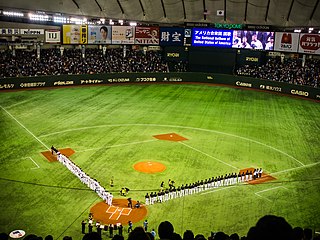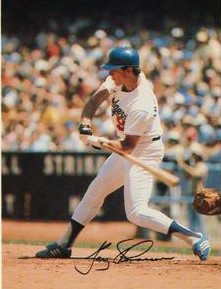Related Research Articles

Nippon Professional Baseball is a professional baseball league and the highest level of baseball in Japan. Locally, it is often called Puro Yakyū (プロ野球), meaning simply Professional Baseball; outside of Japan, NPB is often referred to as "Japanese baseball".

The Yomiuri Giants are a Japanese professional baseball team competing in Nippon Professional Baseball's Central League. Based in Bunkyo, Tokyo, they are one of two professional baseball teams based in Tokyo, the other being the Tokyo Yakult Swallows. They have played their home games in the Tokyo Dome since its opening in 1988. The team's owner is Yomiuri Shimbun Holdings, Japan's largest media conglomerate which also owns two newspapers and the Nippon Television Network.

The Yomiuri Shimbun (讀賣新聞/読売新聞) is a Japanese newspaper published in Tokyo, Osaka, Fukuoka, and other major Japanese cities. It is one of the five major newspapers in Japan; the other four are The Asahi Shimbun, the Chunichi Shimbun, the Mainichi Shimbun, and the Nihon Keizai Shimbun. It is headquartered in Otemachi, Chiyoda, Tokyo.

The mass media in Japan include numerous television and radio networks as well as newspapers and magazines in Japan. For the most part, television networks were established based on capital investments by existing radio networks. Variety shows, serial dramas, and news constitute a large percentage of Japanese evening shows.

Viscount Motono Ichirō was a statesman and diplomat, active in Meiji period Japan.

The Orix Buffaloes are a Nippon Professional Baseball team formed as a result of the 2004 Nippon Professional Baseball realignment by the merger of the Orix BlueWave of Kobe, Hyōgo Prefecture, Japan, and the Osaka Kintetsu Buffaloes of Osaka, Osaka Prefecture, Japan. The team plays in the Pacific League and is under ownership by Orix, a financial services company founded in Osaka.

Warren Livingston Cromartie is an American former professional baseball player best remembered for his early career with the Montreal Expos. He and fellow young outfielders Ellis Valentine and Andre Dawson were the talk of Major League Baseball (MLB) when they came up together with the Expos in the late seventies. Nicknamed "Cro" and "the Black Samurai" in Japan, he was very popular with the fans in Montreal, Quebec, Canada. He won the 1989 Nippon Professional Baseball Most Valuable Player Award during his career playing baseball in Japan for the Yomiuri Giants.

The Kodo-kai is a yakuza criminal organization based in Nagoya, Japan. It is a secondary organization of the Sixth Yamaguchi-gumi, the largest known yakuza syndicate in Japan. With an estimated membership of 4,000, it is the second-largest Yamaguchi affiliate after the Yamaken-gumi, and operates in at least 18 prefectures.

Baseball was introduced to Japan in 1872 and is Japan's most popular participatory and spectator sport. The first professional competitions emerged in the 1920s. The highest level of baseball in Japan is Nippon Professional Baseball (NPB), which consists of two leagues, the Central League and the Pacific League, with six teams in each league. High school baseball enjoys a particularly strong public profile and fan base, much like college football and college basketball in the United States; the Japanese High School Baseball Championship, which takes place each August, is nationally televised and includes regional champions from each of Japan's 47 prefectures.

Star of the Giants is a Japanese sports manga series written by Ikki Kajiwara and illustrated by Noboru Kawasaki. It was serialized in Kodansha's Weekly Shōnen Magazine from 1966 to 1971. It is about the actual baseball team Yomiuri Giants using fictional characters. It was launched by the "Yomiuri Group" which at the time owned not only the actual baseball team, but the TV network Nippon Television, the newspaper Yomiuri Shimbun, as well as Yomiuri Telecasting Corporation. It was adapted into an anime television series broadcast in Japan in 1968. It later spawned two anime sequels and different anime movies. In total there were 262 episodes.
Professional baseball in Japan first started in the 1920s, but it was not until the Greater Japan Tokyo Baseball Club was established in 1934 that the modern professional game had continued success.

Matsutarō Shōriki was a Japanese media proprietor and politician. He was the owner of the Yomiuri Shimbun, founder of the Yomiuri Giants and the Nippon Television Network Corporation.

Gary Leah Thomasson is an American former professional baseball player. He played as an outfielder and first baseman in Major League Baseball (MLB) between 1972 and 1980, most prominently as a member of the San Francisco Giants with whom he played for seven seasons. He also played for the Los Angeles Dodgers, New York Yankees, Seattle Mariners, Montreal Expos, and the Cincinnati Reds. After his Major League Baseball career, he played for the Yomiuri Giants of Japanese Nippon Pro Baseball from 1981 to 1982. Thomasson was a member of the Yankees' 1978 World Series winning team over the Dodgers.
Gokudō (極道) is a Japanese word whose contemporary main usage may be translated as lowlife.
Tatsunori Hara is a Japanese former professional baseball infielder and manager. He played 15 seasons in Nippon Professional Baseball (NPB) for the Yomiuri Giants, and also spent 17 seasons as the club's manager.
Joshua Lawrence "Jake" Adelstein is an American journalist, crime writer, and blogger who has spent most of his career in Japan. He is the author of Tokyo Vice: An American Reporter on the Police Beat in Japan, which inspired the 2022 Max original streaming television series Tokyo Vice, starring Ansel Elgort as Adelstein.
Tokyo Vice: An American Reporter on the Police Beat in Japan is a 2009 memoir by Jake Adelstein of his years living in Tokyo as the first non-Japanese reporter working for one of Japan's largest newspapers, Yomiuri Shimbun. It was published by Random House and Pantheon Books. Max adapted the memoir into a 2022 television series. According to Gavin J. Blair of The Hollywood Reporter, there were individuals that disputed whether certain events in the book happened as stated.
American expatriate baseball players in Japan have been a feature of the Japanese professional leagues since 1934. American expatriate players began to steadily find spots on Nippon Professional Baseball (NPB) rosters in the 1960s. More than 600 Americans have played NPB, although very few last more than a single season in Japan.

Shigeru Mizuhara is a former professional baseball infielder and manager in Japan's Japanese Baseball League (JBL) and Nippon Professional Baseball (NPB). As a player his team won nine JBL championships; as a manager his teams won five Japan Series championships.

The activities of the Central Intelligence Agency (CIA) in Japan date back to the Allied occupation of Japan. Douglas MacArthur's Chief of Intelligence, Charles Willoughby, authorized the creation of a number of Japanese subordinate intelligence-gathering organizations known as kikan. Many of these kikan contained individuals purged because of their classification as war criminals. In addition, the CIA organized and financed a Japanese intelligence gathering program, Operation "Takematsu", utilizing the kikan as part of an intel gathering operation against North Korea, the Kuril Islands, and Sakhalin. One of the kikan created, the "Hattori group", led by Takushiro Hattori, allegedly plotted to stage a coup d'etat and assassinate Prime Minister Shigeru Yoshida on account of his opposition to Japanese nationalism.
References
- ↑ People: Robert Whiting, Japan Times, Vivienne Kenrick, November 12, 2000
- 1 2 3 4 5 "More about Robert Whiting" japanesebaseball.com
- 1 2 3 4 5 6 Blair, Gavin and Whiting, Robert. "Robert Whiting," # 1 Shimbun, Foreign Correspondents' Club of Japan, December, 2013
- ↑ "Osaka mayor, Yomiuri boss trade dictator insults," Japan Today , March 23, 2012
- ↑ "Highest Newspaper Circulation," Highest Daily Newspaper Circulation, Guinness World Records
- ↑ Tsuneo Watanabe, Executive Profile Bloomberg Businessweek
- ↑ Schreiber, Marc. "Best-selling author Robert Whiting talks baseball, gangsters, bribes and more," The Japan Times, April 4, 2004
- ↑ "Author profiles: Robert Whiting" nipponnomirai.jp
- ↑ Downer, Lesley (2018-06-18). "Olympic success". The Times Literary Supplement . Retrieved 2021-11-21.
- 1 2 "Tokyo Underworld: The Fast Times and Hard Life of an American Gangster in Japan" randomhouse.com
- ↑ Kingston, Jeff. "The No. 1 Top Ten: Books on Japan," # 1 Shimbun, Foreign Correspondents' Club of Japan, August, 2011
- 1 2 Sakata, Shane (August 7, 2009). "Tokyo Underworld – Coming to a Theater Near You!". Japan | Japan Travel. Nihon Sun.
- ↑ "Robert Whiting lecture on the Yakuza". New York City: The Japan Society of New York. February 16, 2012. Archived from the original on November 14, 2014.
{{cite web}}: CS1 maint: unfit URL (link) - ↑ Hadfield, James (March 15, 2018). "Netflix's new yakuza flick has Jared Leto on the outs with critics". The Japan Times. Retrieved April 26, 2019.
...despite passing through the hands of DreamWorks, Warner Bros., Paramount and HBO, it never made it to the screen.
- ↑ "Baseball expert lines up new book on mobsters in Japan" The Japan Times, August 1, 2009
- ↑ Armstrong, Jim. “Former Teammates, Opponents Salute Hideo Nomo,” USA Today, July 18, 2008
- ↑ Whiting, Robert. The Book of Nomo, Japanime Co. Ltd., 2017
- ↑ CORPORATION, KADOKAWA. "ふたつのオリンピック 東京1964/2020". KADOKAWAオフィシャルサイト.
- ↑ Whiting, Robert. "Season Opens as Surely as Day Follows Night" The New York Times, March 26, 2008
- ↑ Whiting, Robert. "The Emperor of Swat" The New York Times, August 9, 2007
- ↑ Whiting, Robert. "Baseball in Japan: Not All Cheers" TIME, March 26, 2008
- ↑ Whiting, Robert. “NPB players in need of strong union like MLBPA” The Japan Times, April 14, 2007
- ↑ Whiting, Robert. "Nomo’s legacy should land him in Hall of Fame," The Japan Times, October 24, 2010
- ↑ Whiting, Robert. "Irabu spent final days lost, without purpose" The Japan Times, October 30, 2011
- ↑ "Tokyo Underworld" kirkusreviews.com, December 1, 1998
- ↑ Gallagher, Jack. "Whiting honored by FSAJ" The Japan Times, April 5, 2005
- ↑ Kaplan, Ron. 501 Baseball Books Fans Must Read Before They Die, University of Nebraska Press, 2013
- ↑ Penthouse (Japan), January, 1987
- ↑ Shukan Asahi (Japan), July, 1990
- ↑ Sloan, Dan. “If you still wanna have wa,” # 1 Shimbun, Foreign Correspondents' Club of Japan, June, 2009